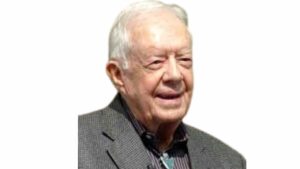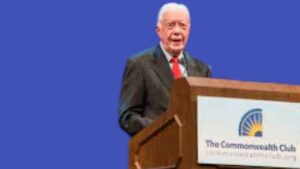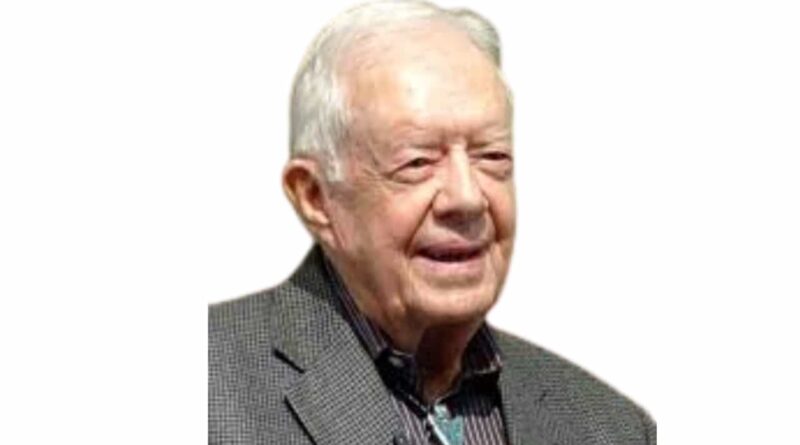Jimmy Carter: A Look at the Life and Impact of the 39th Powerful President of the United States
Jimmy Carter
Jimmy Carter’s Legacy.
Jimmy Carter
Title: The Legacy of Jimmy Carter: A Look at the Life and Impact of the 39th President of the United States
Jimmy Carter: Introduction:
Jimmy Carter served as the President(39th) of the U.S.A from 1977 to 1981.Although his presidency was brief, his impact on American politics and global affairs was significant. In this article, we will take a closer look at the life and legacy of Jimmy Carter.
Early Life and Career:
1st October 1924, Jimmy was born in Plains, Georgia. He graduated from the United States Naval Academy in 1946 and went on to serve in the Navy for seven years. After leaving the military, Carter returned to Georgia and got involved in politics. He served as a state senator from 1963 to 1967 and then as governor of Georgia from 1971 to 1975.
Jimmy Carter: Presidential Campaign and Policies:
In 1976, Carter announced his candidacy for the Democratic nomination for president. He ran as an outsider, positioning himself as a Washington outsider who would bring a fresh perspective to the presidency. Carter’s policies emphasized human rights and social justice, and he promised to reduce government waste and cut taxes for middle-class Americans.
Carter won the Democratic nomination and went on to defeat incumbent President Gerald Ford in the general election. As president, Carter faced several challenges, including rising inflation, energy shortages, and a hostage crisis in Iran.
Despite these difficulties, Carter achieved some notable accomplishments during his presidency, including the establishment of the Department of Education and the signing of the Camp David Accords between Israel and Egypt.

Post-Presidential Career:
After leaving the White House, Carter continued to be active in public life. He founded the Carter Center, a non-profit organization dedicated to promoting peace, human rights, and democracy around the world. He also worked on several humanitarian initiatives, including efforts to eradicate Guinea worm disease and to build affordable housing for low-income families.
Jimmy Carter: Legacy:
Jimmy Carter’s presidency may not have been the most successful in American history, but his impact on the world has been significant. His commitment to human rights and social justice has inspired generations of activists and policymakers, and his efforts to promote peace and democracy have helped to make the world a better place. Today, Carter is remembered as a thoughtful and compassionate leader who worked tirelessly to make the world a more just and equitable place.
Jimmy Carter’s presidency may have been mired in challenges, but he faced them with a deep sense of empathy and compassion that was admired by many. He often spoke openly about his faith and his belief in the power of love and kindness to bring people together. This was reflected in his foreign policy, where he advocated for peaceful diplomacy and worked towards resolving conflicts through negotiation and compromise.
One of Carter’s most notable achievements was the Camp David Accords. In 1978, he invited Israeli Prime Minister Menachem Begin and Egyptian President Anwar Sadat to the presidential retreat at Camp David to negotiate a peace agreement. After 13 days of intense negotiations, the two leaders signed a historic agreement that laid the foundation for peace in the Middle East. Carter’s role in brokering the agreement earned him a Nobel Peace Prize in 2002.
Carter’s commitment to social justice and human rights also extended to his work with the Carter Center. Established in 1982, the Center has worked on a wide range of issues, from election monitoring and disease eradication to conflict resolution and peacebuilding. Carter himself has been involved in many of these initiatives and has travelled extensively around the world to promote his vision of a more just and peaceful world.
In addition to his humanitarian work, Carter has also been involved in several high-profile advocacy campaigns. He has spoken out against discrimination and inequality and has been a vocal critic of U.S. foreign policy on issues such as climate change and human rights abuses.

Today, Carter is widely regarded as one of the most respected elder statesmen in American politics. He has become a symbol of hope and inspiration for many, and his legacy continues to influence the course of American and global affairs. His commitment to social justice, human rights, and peaceful diplomacy has inspired countless individuals around the world to work towards a more just and equitable society.
Jimmy Carter’s post-presidential work has had a profound impact on the world. One of his most significant contributions has been to the fight against the disease. In the 1980s, Carter began working to eradicate Guinea worm disease, a debilitating parasitic infection that affects millions of people in sub-Saharan Africa. His efforts have been successful, and today, Guinea worm disease is on the verge of being eradicated.
In addition to his work on disease eradication, Carter has been a vocal advocate for affordable housing. In 1984, he helped found Habitat for Humanity, a non-profit organization that builds and renovates homes for low-income families. To date, Habitat for Humanity has built or renovated more than one million homes around the world, providing shelter to millions of people in need.
Carter’s advocacy for social justice and human rights has also extended to his work with the Elders, a group of independent global leaders who work together on issues such as peacebuilding, human rights, and climate change. Carter has been a member of the Elders since its inception in 2007 and has played a leading role in many of the group’s initiatives.
Despite his many accomplishments, Carter has faced criticism from some quarters. His handling of the Iranian hostage crisis, in particular, has been a subject of debate and scrutiny. Some have also criticized his approach to domestic policy, arguing that his emphasis on social justice and human rights came at the expense of economic growth and stability.
Despite these criticisms, however, there is no denying the profound impact that Jimmy Carter had on American and global politics.
His commitment to peace, social justice, and human rights has inspired generations of leaders and activists, and his work with the Carter Center and other organizations has improved the lives of millions of people around the world. Today, as he approaches his 98th birthday, Jimmy Carter remains a respected and beloved figure, and his legacy serves as a beacon of hope and inspiration for people everywhere.
One of Jimmy Carter’s enduring legacies is his commitment to the environment and the fight against climate change. He was one of the first world leaders to recognize the threat of global warming, and he has been an outspoken advocate for environmental conservation and sustainability for decades.
Carter’s efforts in this area have been wide-ranging. During his presidency, he created the Department of Energy and initiated several energy conservation programs. He also championed the development of renewable energy technologies, such as solar and wind power.

In the years since leaving office, Carter has continued to work on environmental issues. He has installed solar panels on his property and has been a vocal advocate for the use of renewable energy. He has also worked to raise awareness about the dangers of climate change and has called on world leaders to take bold action to address this critical issue.
Carter’s commitment to the environment is rooted in his deep sense of spirituality and his belief in the importance of stewardship. He has written extensively about the relationship between spirituality and environmental conservation, arguing that our responsibility to care for the earth is a fundamental tenet of many religious traditions.
Throughout his life, Jimmy Carter has been a tireless advocate for social justice, human rights, and environmental conservation. His legacy serves as a reminder of the power of compassion, empathy, and kindness in shaping the course of human events. As we confront the many challenges of the 21st century, we would do well to remember the example of this remarkable man, and to strive to live up to the ideals that he has embodied throughout his life.
JC’s presidency and work
jimmy carter uses
Jimmy Carter is the 39th President of the United States, serving from 1977 to 1981. During his presidency, he oversaw significant changes in foreign policy, including the signing of the Panama Canal Treaty, the Camp David Accords between Israel and Egypt, and the establishment of diplomatic relations with China.
After leaving office, Carter continued to be an active public figure, advocating for human rights, promoting democracy and conflict resolution, and participating in humanitarian efforts through the Carter Center, a non-profit organization he founded with his wife, Rosalynn Carter.
In addition to his political and humanitarian work, Carter is also known for his work as a farmer, author, and teacher. He has written numerous books, including his memoirs, and has taught Sunday school classes for many years.
Here are some additional facts and details about Jimmy Carter:
He grew up on a farm and attended public schools in Georgia before attending the United States Naval Academy in Annapolis, Maryland.
After graduating from the Naval Academy in 1946, Carter served in the U.S. Navy for seven years, including stints on submarines.
Carter entered politics in the 1960s, serving in the Georgia State Senate and later as governor of Georgia from 1971 to 1975.
Carter won the Democratic nomination for president in 1976 and went on to defeat incumbent Republican President Gerald Ford in the general election.
As president, Carter faced several domestic and international challenges, including inflation, an energy crisis, and the Iran hostage crisis.
In 1982, Carter founded the Carter Center with his wife, Rosalynn, to promote human rights, democracy, and conflict resolution around the world. The organization has worked on issues such as eradicating disease, monitoring elections, and promoting peace in areas of conflict.
In 2002, Carter was awarded the Nobel Peace Prize for his efforts to promote peace and democracy.
Carter is also an accomplished author, having written more than 30 books on a variety of topics, including his experiences as president, his work with the Carter Center, and his faith.
Carter is the longest-retired president in U.S. history, having left office more than 40 years ago. Despite his age, he continues to be an active public figure and advocate for various causes.
Jimmy Carter’s Career
jimmy carter CEO
Jimmy Carter is a former President of the United States, but he has never served as a CEO (Chief Executive Officer) of a corporation or business. After leaving office, he has been involved in various humanitarian and social justice causes, such as the Carter Center, which focuses on promoting democracy and human rights worldwide. He has also authored several books and has been involved in mediation and conflict resolution efforts around the world.
His work with the Carter Center, Jimmy Carter has been involved in a variety of other charitable and philanthropic causes. For example, he has worked with Habitat for Humanity, a non-profit organization that helps build affordable housing for people in need. Carter himself is an active volunteer with the organization and has helped build homes in various locations around the world.
Carter has also been involved in promoting environmental sustainability and clean energy. He has spoken out about the importance of reducing greenhouse gas emissions and transitioning to renewable energy sources and has worked on projects to install solar panels on his properties as well as on public buildings.
Beyond his humanitarian and environmental work, Carter has also continued to be an advocate for peace and diplomacy on the global stage. He has been involved in diplomatic efforts to resolve conflicts in various parts of the world and has been a vocal critic of the use of military force as a first resort in international disputes.
Overall, Jimmy Carter has had a long and varied career as a public servant and advocate for a wide range of causes. While he may not have served as a CEO in the traditional sense, his impact on the world has been significant and far-reaching.
Jimmy Carter: A Look at the Life and Impact of the 39th Powerful President of the United States




